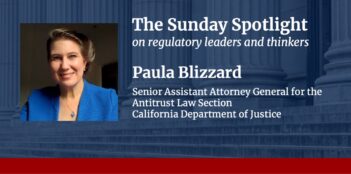
Scholar argues that, to address natural monopolies, industry-specific regulators should be replaced by the Justice Department and the FTC.
Antitrust violations, such as agreements to fix product prices, to divide markets, or to reduce market output, are not just a concern for the U.S. Department of Justice and the Federal Trade Commission (FTC).
The U.S. Congress has also empowered industry-specific regulators to address antitrust violations. These regulators include the Federal Maritime Commission (FMC), which can seek injunctions to redress anticompetitive agreements between ocean shipping carriers. The FMC, however, has never filed a case against these carriers since Congress gave it that power in 1984.
Should Congress keep charging industry regulators with antitrust enforcement in the industry they supervise?
In a recent article, Erika M. Douglas, a professor at Temple University Beasley School of Law, argues that industry regulators have long failed to enforce antitrust provisions, resulting in a gap in policing anticompetitive conduct. She contends that Congress should allow the Justice Department and the FTC to assume the primary responsibility for scrutinizing anticompetitive conduct in regulated industries.
The Sherman Act, the Clayton Act, and the Federal Trade Commission Act are the three major antitrust laws in the United States. These laws empower the Justice Department and the FTC to preserve and restore competition across every sector of the economy. Congress, however, has also vested certain industry regulators with the power to maintain competitive markets in industry-specific statutes. Douglas explains that this legislative design is distinctive because it asks industry regulators to consider nothing beyond competition when supervising particular industries.
But why would Congress give industry regulators an antitrust enforcement power?
Douglas identifies that the idea originated from the deregulatory era in the 1980s when the federal government attempted to replace regulatory control over the economy with open markets and competition.
Although Congress expects industry regulators to assume the responsibility of antitrust enforcement in their respective industries, several regulators have long abandoned their duty, notes Douglas.
One such regulator Douglas identifies is the FMC. Congress requires ocean shipping carriers to file specific types of agreements with the FMC. These agreements include ones among these carriers to fix transportation rates or shipping volumes, as well as agreements that “control, regulate, or prevent competition in international ocean transportation.”
An effective filing will exempt such agreements from antitrust scrutiny by the Justice Department and the FTC. Instead, Congress granted the FMC exclusive power to pursue an injunction in the federal court against any filed agreement likely to reduce competition.
The FMC, however, has never brought an enforcement action against ocean shipping carriers since Congress conferred such authority on it in 1984, notes Douglas.
Although the FMC maintains that vigorous or even ruinous competition in the ocean shipping industry made action unnecessary, both the Justice Department and scholars have found the justification unsound, notes Douglas. She also stresses that the industry has suffered from high market concentration and a history of anticompetitive conduct, which suggests a need for rigorous antitrust oversight.
The other two regulators Douglas identifies as partially responsible for antitrust enforcement are the Surface Transportation Board (STB) and the U.S. Department of Agriculture (USDA). The STB has the power to allow a rail carrier access to a competitor’s railroad tracks if it finds it necessary to promote a competitive rail service. USDA may require meat packers and swine contractors to cease conspiring to manipulate prices, among other things, and may impose a civil monetary penalty. Douglas, however, finds that these regulators also underenforce these antitrust provisions.
Douglas contends that industry regulators’ inaction creates a gap in overseeing market competition. The problem is more serious when a particular piece of legislation bars the Justice Department and the FTC from enforcing general antitrust laws—the Sherman Act, the Clayton Act, and the Federal Trade Commission Act—in a regulated industry, notes Douglas.
Douglas suggests that Congress should abandon the unrealistic expectation that industry regulators will zealously police anticompetitive conduct. She argues that the Justice Department and the FTC are more appropriate agencies for creating a vibrant market because they have actively brought enforcement actions.
In addition, Douglas observes that the Justice Department and the FTC are more likely to spot competition concerns, such as price-fixing agreements, because they have gained much experience and expertise from their regular focus on antitrust enforcement.
Douglas concludes by arguing that Congress should either repeal the antitrust provisions in industry-specific legislation or authorize the Justice Department or the FTC to enforce those provisions. She also encourages the Justice Department and the FTC to use their existing antitrust authority in regulated industries if current law permits.
As for future legislation, Douglas notes that Congress should be cautious about the risk of underenforcement when granting industry regulators exclusive power to oversee competition in a regulated industry.
Not every industry regulator will necessarily ignore its obligations. Nonetheless, Douglas maintains that assigning antitrust enforcement to industry regulators could lead to future unintended gaps.



